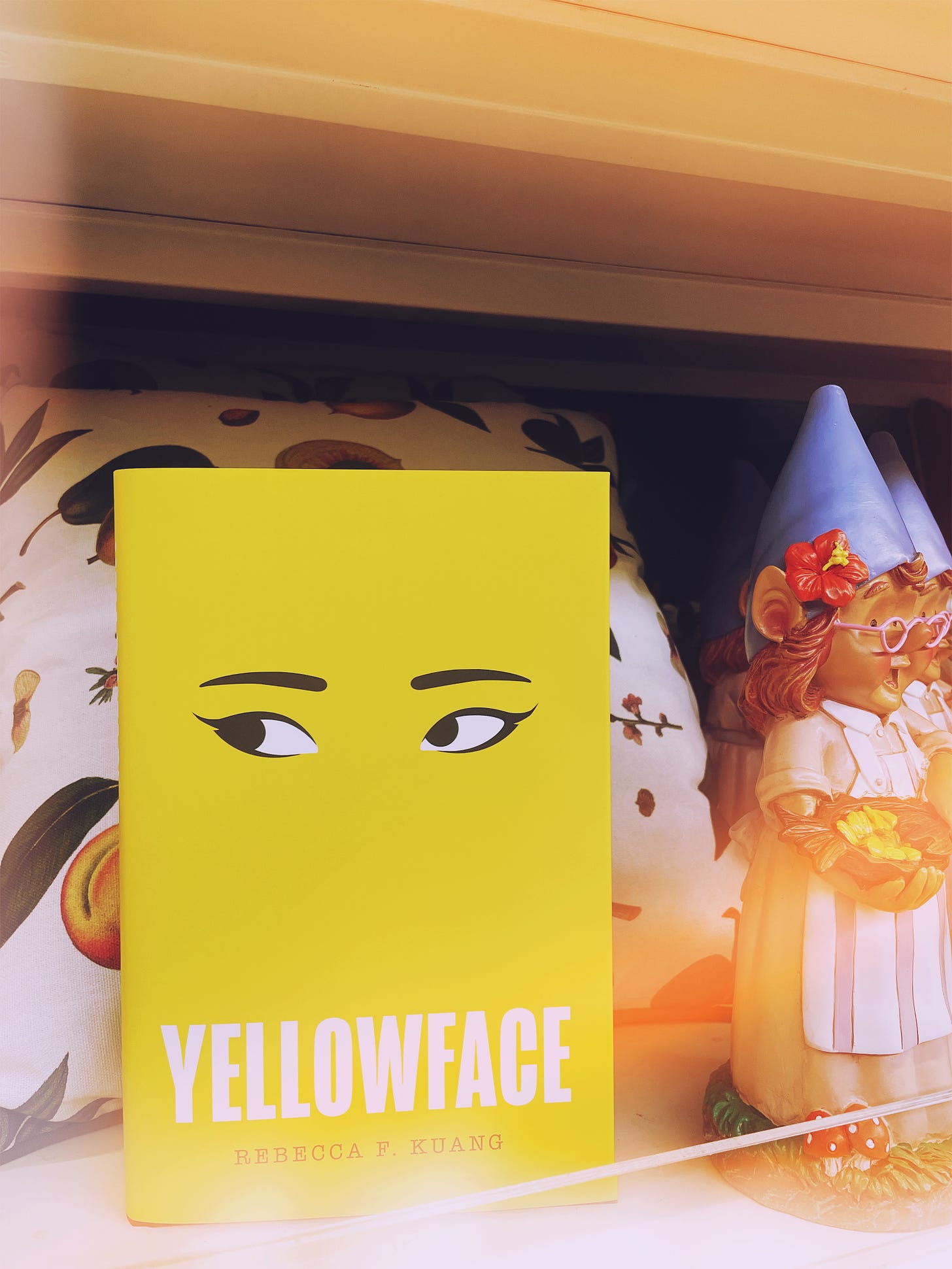The thing about dogfights is that you never know just how vulnerable you are until you get in the middle of them. One minute you’re standing upright, and the next you’re being dragged in different directions; parts of you splitting open, to be shared by everyone.
Just before my birthday, I saw the striking cover in the supermarket. I had heard about ‘Yellowface’ on the grapevine. It wasn’t until I read the blurb that I realised it was a satirical take on the publishing industry. If you know me, you know I am quite outspoken about issues within publishing, and I know I’ve ticked off a few people because of it.
Every time I point out favouritism in the industry, somebody either blocks me, calls me bitter, or does all that and more. People don’t like it when you reasonably point out flaws within their fantasy. We like to think of the industry as a community where we’re all for one and one for all, but that just isn’t true. Publishing is ugly, political, mean, life changing, and everything in between.
In ‘Yellowface’ we follow June Hayward, a white writer who is continually overshadowed by publishing’s darling, Athena Liu. When Athena dies right in front of her, June steals Athena’s just-finished, experimental manuscript about the unsung contributions of Chinese labourers to the British and French war efforts during World War I.
June Hayward soon becomes Juniper Song, and so ensues an interesting world of lies, envy, cultural appropriation, and plagiarism; the truths that both make the industry and its players uncomfortable. I see so many platitudes from fellow indie writers online that go something like this:
“Other writers are not your competition. We should build each other up.”
While it’s a nice idea, it feels hollow. We are always competing for places in magazines and competitions (unless you don’t submit to either of those things, in which case, power to you). While books such as ‘Yellowface’ have a huge publishing house behind them, many of us indie folk only have ourselves. Fortunately for me, I have a good grasp on business strategy and social media, but my experience isn’t universal. A lot of older writers certainly struggle with modern ways of promoting themselves, and it would seem the act of promotion in itself is an Achilles heel.
R F Kuang does an excellent job of holding a mirror to the giant pores of publishing, and that is why I find the criticism of this book fascinating. A few people have said it is too on the nose. Some are worried that it is too specific to “age well”. My assumption is that they are worried about the relatability of the book, which I have always found a little silly. You shouldn’t need to relate to a book or character to appreciate it. There are so many Classic books (ones we still discuss fondly) that are hyper-specific to their era.
In the book, Juniper Song says:
“You have no assurance that what you’re creating has any value, and any indication that you’re behind in the rat race sends you spiralling into the pits of despair. Keep your eyes on your own paper, they say. But that’s hard to do when everyone else’s papers are flapping constantly in your face.”
I think every writer has felt this way before, but most are scared to admit it out of the fear of being seen as a clout chaser or unsupportive of other writers. Daring to want what others seem to have is taboo within this industry, but Kuang illustrates this feeling in a realistic way.
‘Yellowface’ poses the question of cultural appropriation and what it means to be a minority in the industry. As a white woman, I cannot speak on this to any kind of degree, but I found the discussion enlightening. These questions are hot topics right now, and I don’t believe anyone is really sure of the exact answer. What I think really adds to the conversation are the faux articles and comments on social media; it all feels so true to what actually happens. In my view, this was an intentional decision by Kuang. Juniper, who is passing herself off as an Asian woman, finds that her ‘story’ is being narrated by all voices except hers. This acerbic irony is what made my heart sing.
Ultimately, ‘Yellowface’ is the book that publishers want you to ignore. Our industry is littered with issues, and while many want to believe in a dream, some of us desire change. That doesn’t mean you have to pick up a pitchfork and destroy your mental health in the process, but just because your heart isn’t hurting doesn’t mean you’re not drowning. R F Kuang has done an incredible job with this book, and I will recommend this to everybody I know.
‘Yellowface’ is available in Hardback, Ebook, and Audiobook.






Great article! I hadn’t heard of this one but I’m intrigued. There’s something about the way the publishing industry pushed authors’ personal story as a selling point that doesn’t sit right with me. Is there a middle ground between celebrating identity and amplifying voices and tokenism?
As a newbie but a late bloomer LOL and a WOC, I'm learning so much about the industry, having a peek at its underbelly. It's not always pretty if at all. Very well said!!